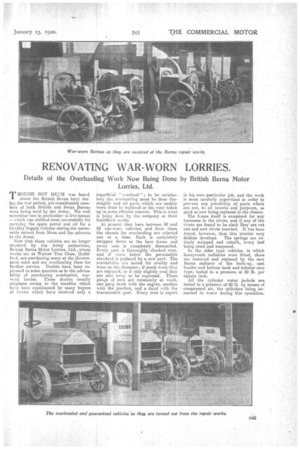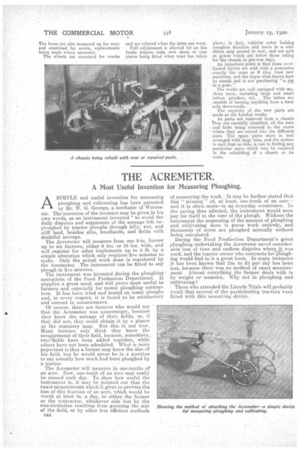RENOVATING WAR-WORN LORRIES.
Page 23

Page 24

If you've noticed an error in this article please click here to report it so we can fix it.
Details of the Overhauling Work Now Being Done by British Berna Motor Lorries, Ltd.
THOUGH NOT MUCH was heard about the British Berria lorry dun lug the war period, yet considerable numbers of both British and Swiss Bernas were being used by the Army. We well remember one in particular—a five-tonner —which was utilized most successfully for carrying the spare petrol and oil for a Cavalry Supply Column during the memorable retreat from Mons and the advance to the Aisne.
• Now that these vehicles are no longer required by the -Army authorities, British Berns. Motor Lorries, Ltd., whose works are at Walnut Tree Close, Guildford, are purchasing many at the Government sales and are overhauling them for further service. Doubts have been expressed in some quarters as to the advisability of purchasing overhauled, warworn lorries. These doubta. usually originate owing to the troubles which have been experienced by many buyers of lorries Which have received only a superficial " overhaul " ; to be satisfactory the overhauling must be done thoroughly and all parts which are unduly 410111 must be replaced or the wear taken up in some efficient manner. This is what is being done by the company at their Guildford works.
At present they have between 50 and 60 war-worn vehicles; and from these the chassis for overhauling are selected One at a time. Each is completely stripped down to the -bare frame and every unit is completely, dismantled. Every part is thoroughly checked over, and if worn below the permissible standard is replaced by a new part. The crankshafts are tested for ovality. and wear on the diameter ; if much worn they are replaced, or if only slightly oval they are sent away to be reground. Three gangs of men are constantly at work, one gang deals with the engine, another with the gearbox, and a third with the transmission gear. Every man is expert
in his own particular job, and the work is most carefully supervised in order to prevent any possibility of pasts which are not, to all intents and purposes, as good as new being replaced in the chassis.
The flame itself is examined for any looseness in the rivets, and if any of the rivets are found to be slack They are cut out and new rivets inserted. It has been found, however, that this trouble very Nlelom develops. The springs are en, tirely stripped and rebuilt, every leaf being reset and tempered.
In the older type vehicles, in which honeycomb radiators were fitted, these are removed and replaced by the new Berna radiator of the built-up, cast header and bottom tank and tubular core type, tested to a pressure of 30 lb. per square inch.
All the cylinder water jackets are tested to a pressure of 60 lb. by means of
• -compressed air, the cylinders being immersed in water during this operation.
The bores are also measured up for wear and examined for scores, replacements being made where necessary. The wheels are examined for cracks and are relyred. when the tyres are worn. Full adjustment is allowed for on the brake tension rods, new shoes or cam pieces beirig fitted when wear has taken
place ; in fact, vehicles enter looking' complete 'derelicts and leave in a condition only second to new, and are sold at prices which are below these ruling for the chassis in pre-war days.
An important point is that these over• hauled lorries are sold with a guarantee exactly the same as if they were new machines and the buyer thus knows how he stand; and is not purchasing "a pig in a poke." The works are well equipped with 'machine tools, including large and small lathes, 'grinders, etc. The lathes are .capable of turning anything from a back axle downwards.
The majority of the new parts aro made at the London works.
As parts axe removed from a chassis . 'they are carefully classified, all the nuts and, bolts being returned to. the stores where they are sorted into the different sizes. The spare parts store is Well arranged -with large bins, and the system is such that no time is lost in finding any particular spare which may be required in the rebuilding of a chassis or its units.


























